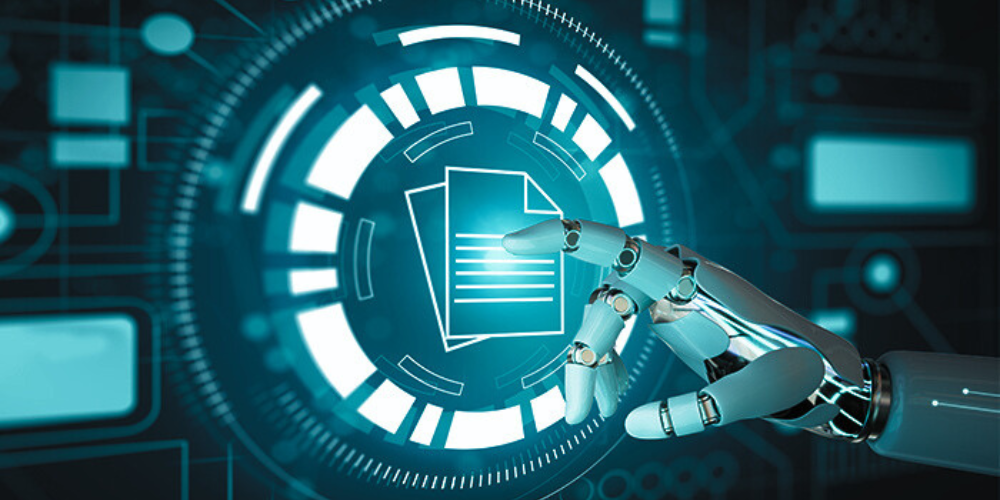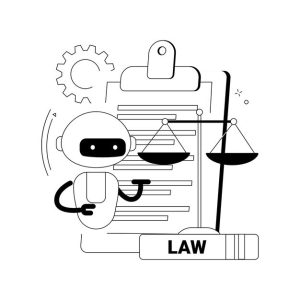Artificial Intelligence is transforming businesses in every sector including legal practice. The implementation of AI-based tools during 2025 has radically transformed legal work activities to boost efficiency while delivering improved services to clients for law firms. Adaptation to AI lets legal professionals discover expanded business options while their workflows become more organized and their hours billed per project increase. This blog highlights AI advancements in the legal sector including effects on attorneys and clients together with moral issues and forthcoming position changes.
The Impact of AI on Legal Work
The main strength AI provides to legal tasks lies in its automated management of repetitive work. Documents and legal research and contract analyses take up a majority of total work hours for legal experts. Tools powered by artificial intelligence reduce these work hours dramatically since they conduct rapid assessments of large legal datasets to extract necessary precedents alongside important findings.
Key Benefits of AI in Legal Work:
- Automating contract drafting and review: Through its connection to legal databases AI technology produces contracts which uphold both accuracy plus consistency.
- Enhancing legal research: The evaluation of legal cases by AI tools enables lawyers to process thousands of precedents within seconds for quicker discovery of suitable legal references.
- Reducing human error: The use of AI detects and prevents mistakes that people might make during review of contracts and their clauses in addition to checking compliance requirements.
- Increasing productivity: Lawyer productivity increases by 266 million hours per year which amounts to four hours per week on average across the United States.
Using artificial intelligence tools in legal work enables organizations to decrease costs while advancing accuracy and enhancing customer contentment.
How AI Benefits Legal Clients
Current clients want law firms to provide quick affordable solutions which deliver data-driven results. AI technology helps law firms fulfill their clients’ modern service needs through efficient delivery systems.
How AI Improves Client Experience:
- Faster response times: Fast legal responses emerge from AI chatbots combined with virtual assistants which assist both clients and their communication using instant guidance.
- Predictive analytics: AI uses predictive analysis to evaluate past judicial decisions thus allowing lawyers to deliver improved strategic guidance.
- Personalized legal services: AI-generated insights enable law firms to provide customized legal services by adjusting their approaches to match each client’s requirements.
- Cost savings: Law firms that cut down research and documentation durations achieve lower operating costs which allow them to provide better price discounts to clients.
Many legal clients are reluctant to accept artificial intelligence involvement in judicial decision processes. Law firms need to guarantee their clients that AI boosts efficiency yet human experience stands vital for accurate legal understanding of intricate matters.
Ethical Concerns Surrounding AI in Law
The implementation of AI technology in legal settings creates numerous positive effects but gives rise to essential moral problems and regulatory standards. Legitimate practitioners from the survey declared AI representation in court proceedings as a practice that exceeds boundaries while simultaneously opposing unmonitored AI-generated legal counsel with a rate of 83% and amplifying their reservations regarding computer-based representation by 96%.
Major Ethical Concerns in AI-Driven Legal Work:
- Data privacy and security: The processing of huge amounts of confidential client data through AI tools demands absolute data protection as a primary point of concern.
- Bias and fairness: AI-based legal recommendations could become unfair due to the way they integrate or reproduce biases which originate from their training data.
- Accountability: It becomes complex to determine who will be responsible when mistakes appear in legal documents produced by AI systems.
- Human oversight: The legal field requires lawyers to build formal protocols which determine AI applications within professional practice.
Dimensions of AI ethics codes and industry-wide regulations together with AI certification programs serve to enable proper AI usage according to many legal organizations.
Future Roles and Skills in AI-Driven Law Firms
The use of AI technologies does not intend to remove lawyers from professional practice, instead it transforms the work performed by legal professionals. Modern legal technology creates new specialized AI roles which are finding employment in legal departments along with corporate entities and law firm organizations.
Top Emerging Roles in AI-Enabled Legal Firms:
- AI Implementation Managers: The role of the AI Implementation Manager entails conducting oversight for the integration of AI technologies into legal work processes.
- Legal Tech Specialists: Law firm employees who maintain expertise in using Artificial Intelligence for research and document processing.
- AI Ethics Consultants: Professionals who ensure organizations adhere to AI ethical requirements as well as regulatory standards serve as AI Ethics Consultants.
- Cybersecurity and Data Privacy Specialists: Cybersecurity and Data Privacy Specialists maintain a protective role around legal data from security threats derived from AI technologies.
Professionals working in the legal field must acquire fresh competencies for successful operation in AI-empowered work environments. Numerous assessments show that these specific skills are currently facing increased demand according to profession-based surveys:
- Adaptability to technology (71% increase)
- Problem-solving and critical thinking (56% increase)
- Creativity in legal strategies (53% increase)
- The demand for effective communication abilities in AI-smart legal consultancy has risen by 52 percent (52% increase).
Law firms which implement AI training programs will establish superior competitive positions because they keep their workforce at the forefront of technological innovation.
Conclusion: The AI-Driven Future of Legal Practice
During this current period in 2025 the legal industry undergoes deep structural changes. AI technology enables the automation of repetitious legal work that increases lawyer performance while driving better customer satisfaction levels. Advanced technologies in legal practice demand ethical validation as well as proper monitoring systems to ensure their responsible application.
To compete in their market law firms must make smart choices between utilizing AI technologies for operational speed and preserving human specialized skills which are core to legal practice. Legal professionals who conduct AI usage with care will strengthen their professional capabilities and increase client value throughout future years.
Law practice stands at a turning point where AI introduces revolutionary changes. Your firm’s future depends on exploring Artificial Intelligence tools which provide legal strategies to prepare it for the upcoming era.










